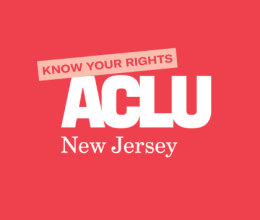
ACLU-NJ Executive Director Amol Sinha calls Dec. 16 "One of the most important days for civil rights in NJ history"
Statement from ACLU-NJ Executive Director Amol Sinha on the passage of six important state legislative measures on Monday, Dec. 16:
“Some of the most important civil rights legislation in New Jersey history was passed on Monday, Dec. 16, 2019. That day was more than just legislators passing bills. It was the fruition of some of the most important civil rights struggles in all of New Jersey history.
We want to express our gratitude to Senate President Sweeney and Assembly Speaker Coughlin along with the first prime sponsors of the six bills, Senators Cunningham, Rice, Greenstein, Scutari and Vitale and Assembly members Quijano, Holley, McKnight, Lopez and Sumter. We also thank every member of the Legislature who stood up in support at events and in writing and those who voted yes and made history by passing these historic pieces of legislation.
Driver’s Licenses for All:
Passage of this legislation means people whose lives were defined by the difficulty of getting by without a license will be able to drive, prove who they are, and move freely, with less to fear. It will make our communities safer and our economy stronger.
Voting Rights Restoration for People on Probation or Parole:
Passage of this bill means that, for the first time, New Jerseyans on probation or parole will be able to vote. That’s more than 83,000 people who unfairly had their vote taken away because of a 250-year-old racially motivated law. This is a fundamental and welcome shift in our democracy – our legislature understands that criminal history should not be determinative of one’s right to vote.
Hair Discrimination Based on Race:
Passage of the CROWN Act means people can live with less fear that the hair they were born with could put their jobs, their opportunities, or the way they live their lives at risk. Our state is the third to ban racial discrimination based on hair, and, together with powerful guidance from New Jersey’s Division on Civil Rights, New Jersey far surpasses anti-discrimination laws at the federal level.
Dignity for Incarcerated Primary Caretaker Parents Act:
Passage of this legislation means that caretaker parents and their children can maintain a connection even through prison walls. This legislation means parents don’t have to choose between paying for telephone calls with their children and taking care of their essential needs as human beings. Finally, it increases transparency, accountability and oversight of the New Jersey Department of Corrections.
Expungement Reform:
Passage of this legislation means that many New Jerseyans will no longer be subjected to the countless collateral consequences of a criminal conviction, and they’ll have more opportunities to live full lives after completing a sentence. This legislation also creates a pathway for New Jersey to develop “clean slate” automatic expungement processes that will extend the benefits of expungement to many.
Marijuana Legalization Constitutional Amendment Question:
Advocates are united that marijuana should be legalized through legislation focusing on racial justice, not a constitutional amendment – and yet, passage of the ballot-question resolution by a super-majority shows the progress that New Jersey has made to end the civil rights crisis of marijuana arrests. The state is finally on a concrete path towards full legalization.
These bills claim New Jersey’s rightful place as a leader on civil rights and social justice, and stand for the principle that justice isn’t for some, but for all. We look forward to Governor Murphy signing all of these bills in short order, ensuring a more equal and more just New Jersey.”



